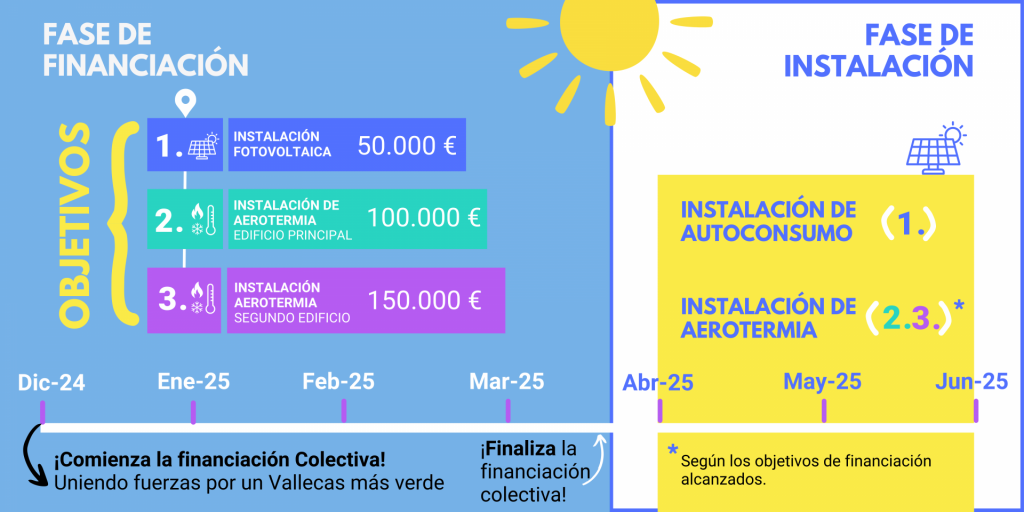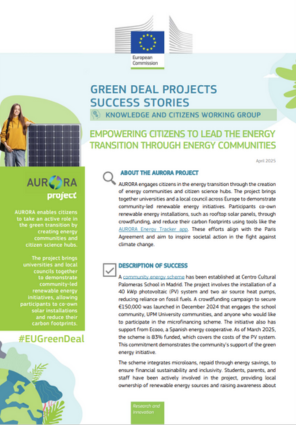About the project
AURORA is engaging citizens in the energy transition through involving the public in green energy initiatives and empowering them to make more informed energy-usage decisions in their day-to-day lives. AURORA project is creating energy communities and citizen science hubs across Europe at four universities and one local council, to demonstrate community-led renewable energy schemes. Participants become “prosumers” of energy by co-owning renewable energy installations, such as rooftop solar panels, which are financed through crowdfunding. Additionally, citizens are supplied with the tools to reduce their own carbon emissions with the AUORA Energy Tracker app. Users can track their energy usage and receive personalised recommendation to change their energy consumption habits and reduce their carbon footprint. They will also have the opportunity to invest in local community renewable energy to offset their emissions. These efforts align with the Paris Agreement and aim to inspire societal action in the fight against climate change.
Description of success
AURORA has reached an agreement to establish a community energy scheme at Colegio Centro Cultural Palomeras, a primary and secondary school in Madrid. A photovoltaic (PV) system and two air source heat pumps will be installed at the school, reducing its reliance on fossil fuels. The initiative will particularly address air conditioning needs in hotter months and adapt the school to climate change.
The initiative will be funded using community microfinancing, a model of financing that invites small investments from individuals who may otherwise not meet the income requirements of such large initiatives. The microloans will be repaid to investors using the savings that are made on the electricity bill and will include a return on investment of 1.5% per year over 15 years. The crowdfunding appeal was launched in December 2024 and aims to raise €150,000 primarily from communities at the school itself and the Technical University of Madrid (UPM), where the AURORA project is coordinated. This community-led model is inclusive, allowing local people to be involved in green power generation and to contribute to making their community more sustainable. Additional support will come from Ecooo, a Spanish energy cooperative that works towards a solar revolution. As of March 2025, the crowdfunding successfully reached approximately 80% of its target from over 150 investors, which will fully fund the PV system and one heat pump. The final phase of crowdfunding now aims to secure the remaining funds and has been opened to EU international investors.
Students, parents, and staff have been actively involved in the project, providing local ownership of renewable energy sources and raising awareness about climate change. Jesús García Rincón, the cooperative manager at Colegio Centro Cultural Palomeras, underlined the importance of the initiative, stating in an interview “… it encourages other local organisations and schools to promote clean energy generation and more responsible energy consumption. It’s also because we believe that stopping climate change is not possible without greater involvement from civil society”.

Figure 1: Communication material for local stakeholders demonstrating an overview of the green energy initiative and its timeline.
Highlights
Secured legal and technical agreements for the installation of solar panels and heat pumps at Colegio Centro Cultural Palomeras.
Launched a crowdfunding campaign to raise €150,000 through a microfinancing model that allows school and university communities to invest in local climate adaptation.
Secured ~80% of the crowdfunding target, covering the costs of the PV system and one heat pump, with the opportunity to invest still open and ongoing until the end of April 2025.
Developed an inclusive financing model where community investment opportunities start at €20 or €100 and are repaid with a financial return from sustainable energy savings, making the project accessible to all.
Outputs
The designs for the photovoltaic system and air source heat pumps have been finalised and all necessary legal agreements and approvals from involved parties have been secured. The financing phase of the initiative began in December 2024 and has been extended to run until the end of April 2025.
Once the financing phase is complete, the installation phase will begin in May 2025. First the photovoltaic system will be installed and then, depending on how much capital is raised, the two heat pumps will be installed.
Impact
The community energy scheme at Colegio Centro Cultural Palomeras demonstrates the power of local collaboration in achieving renewable energy goals. Energy costs for the school are reduced, fossil fuel reliance is minimised, and students and families are actively engaged in the energy transition. The initiative serves as a model for other schools and public buildings in Madrid, with the city’s officials closely observing its progress for replication.
The project is building broader climate awareness, showing that communities can take meaningful action against climate change. The AURORA Energy Tracker app reinforces this by connecting personal carbon reductions with community investments, inspiring further participation in renewable energy schemes. This approach strengthens the role of citizens as active contributors to the green transition.
Lessons
The school community has been integral to the successful launch of the initiative and in particular, families have been heavily involved and supportive.
The initiative has taken over 12 months to develop and coordinate different actors which has required patience and persistence.
The new renewable energy installation will be an educational opportunity for students at the school, and details of the project will be brought into their curricular and extra-curricular activities.
Other Information
More information about the initiative can be found on the Colegio Centro Cultural Palomeras website.

